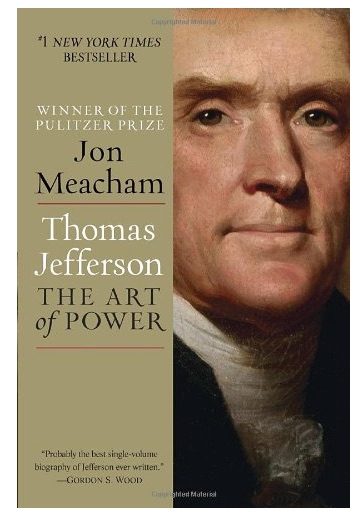In this Virginia History Blog we look at at Thomas Jefferson, his presidential governance and his historical legacy. “Thomas Jefferson: The Art of Power” is a popular account of Jefferson’s use of power in political office.
“Jefferson’s Vendetta” describes the prosecution of Aaron Burr for treason during Jefferson’s second administration. “Mr. Jefferson’s Hammer” describes William Henry Harrison’s Indian policy in Indiana. “Thomas Jefferson: Reputation and Legacy” examines Jeffersons’s amassed historical sources and historian interpretations of them.
Thomas Jefferson: The Art of Power

Jon Meacham wrote Thomas Jefferson: The Art of Power in 2013. It is available from Random House, on Kindle and online new and used.
Former journalist Jon Meacham’s popular history of Thomas Jefferson’s life focuses on the essence of the political Jefferson by describing his core philosophies and principles, touching on his major accomplishments and failures, and pointing to some of the contradictions in his legacy.
Though a man who hated contention and controversy, Jefferson sought to advance enduring personal freedom in a democratic republic newly made domestically on a social foundation of former colonial elites amidst an international world of royalist empires. While surveying many important events over the fifty years that Jefferson was at the center of public life in America from 1776 to 1826, intricate maneuverings against Burr or concerning the Embargo of 1807 are only briefly mentioned. He outlines the historians’ controversy about Sally Hemings in an appendix.
To buy “Thomas Jefferson: The Art of Power” on Amazon, click here.
Jefferson’s Vendetta

Joseph Wheelan wrote Jefferson’s Vendetta: The Pursuit of Aaron Burr and the Judiciary in 2005. It is available on Kindle and online new and used.
Journalist Joseph Wheelan describes the trial and acquittal of former Vice President Aaron Burr for treason on the charge of conspiring to conquer Mexico and establish an empire including part of the western United States. Although the Jeffersonians failed to prove it in court, historians have demonstrated Burr’s probable guilt.
Despite Jefferson’s correct intuition, the prosecution took shortcuts, revealing a strong personal bias. Wheelan highlights the personal nature of Jefferson’s vendetta against Burr who nearly high-jacked the Presidency from Jefferson in 1800.
To buy “Jefferson’s Vendetta” on Amazon, click here.
Mr. Jefferson’s Hammer

Robert M. Owens wrote Mr. Jefferson’s Hammer: William Henry Harrison and the Origins of American Indian Policy in 2007. It is available from University of Oklahoma Press, on Kindle and online new and used.
William Henry Harrison was born into the Virginia gentry, and made governor of Indiana Territory by Thomas Jefferson. His hatred of the British and their Indian allies was cultivated during Revolutionary service under Anthony Wayne. As governor, Harrison ruthlessly pursued Jefferson’s goal of acquiring Indian lands, and in so doing gained important support in both Washington and Indiana.
But after 1805 Harrison began to encounter local opposition, leading him to use bribery and deceit to continue his acquisitions while blaming Indian resistance on British agents. Harrison’s administration is ended with his accepting an Army commission in the War of 1812 but as commander of the U.S. Army of the Northwest, he was instrumental in negotiations with the Indians at the end of the war. Harrison later became ninth president of the United States.
To buy “Mr. Jefferson’s Hammer” on Amazon, click here.
*Ronald L. Hatzenbuehler wrote “I Tremble for My Country”: Thomas Jefferson and the Virginia Gentry in 2006. It is not in print but available online new and used.
To buy “I tremble for My Country” on Amazon, click here.
Thomas Jefferson: Reputation and Legacy

Francis D. Cogliano wrote Thomas Jefferson: Reputation and Legacy in 2006. It is available from the University of Virginia Press and online new and used.
Hatzenbuehler divides his book into two parts. The first looks at Jefferson’s conscious efforts to shape his historical legacy. He did so by writing about affairs as history with a moral lesson to convey. He collected documents, books and newspapers, but he also appreciated primary sources, and he too care to organize and preserve his correspondence in their tens of thousands with their detailed versions of his career’s political controversies.
Jefferson’s chosen tombstone accomplishments dealt with political freedom, religious freedom, and freedom of the mind. But the second part of the book guides the reader through half a century of Jefferson scholarship, including national expansion, war and slavery. These often disputing interpretations seek to establish the proper context to evaluate Jefferson’s life.
To buy “Thomas Jefferson: Reputation and Legacy” on Amazon, click here.
Additional history related to Virginia during this time period can be found at the Table of Contents of TheVirginiaHistorian website on the page for Revolution, Constitution and New Nation Era 1750-1824. Titles are organized by topics, political and economic Virginia, social history, gender, religious, African American, and Wars in Virginia 1750-1824.
General surveys of Virginia History can be found at Virginia History Surveys. Other Virginia history divided by topics and time periods can be found at the webpage Books and Reviews.
Note: Insights for these reviews include those available from articles in the Virginia Magazine of History and Biography, the William and Mary Quarterly, the Journal of the Civil War Era, the Journal of Southern History and the Journal of American History.

